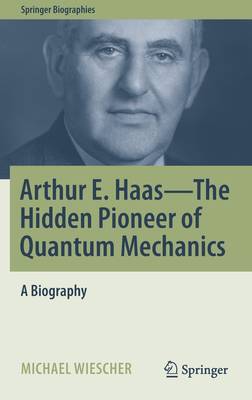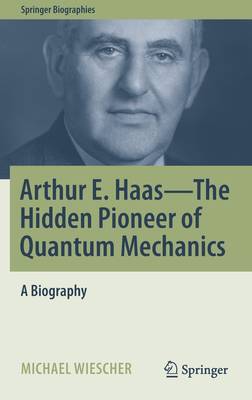
En raison d'une grêve chez bpost, votre commande pourrait être retardée. Vous avez besoin d’un livre rapidement ? Nos magasins vous accueillent à bras ouverts !
- Retrait gratuit dans votre magasin Club
- 7.000.000 titres dans notre catalogue
- Payer en toute sécurité
- Toujours un magasin près de chez vous
En raison de la grêve chez bpost, votre commande pourrait être retardée. Vous avez besoin d’un livre rapidement ? Nos magasins vous accueillent à bras ouverts !
- Retrait gratuit dans votre magasin Club
- 7.000.0000 titres dans notre catalogue
- Payer en toute sécurité
- Toujours un magasin près de chez vous
126,95 €
+ 253 points
Format
Description
The book highlights the personal and scientific struggles of Arthur Erich Haas (1884-1941), an Austrian Physicist from a wealthy Jewish middle-class family, whose remarkable accomplishments in a politically hostile but scientifically rewarding environment deserve greater recognition.
Haas was a fellow student of both Lise Meitner and Erwin Schrödinger and was also one of the last doctoral students of Ludwig Boltzmann. Following Boltzmann's suicide, Haas was forced to submit a more independent doctoral thesis in which he postulated new approaches in early quantum theory, actually introducing the idea of the Bohr radius before Niels Bohr. It is the lost story of a trailblazer in the fields of quantum mechanics and cosmology, a herald of nuclear energy and applications of modern science. This biography of Haas is based on new and previously unpublished family records and archived material from the Vienna Academy of Science and the University of Notre Dame, which the author has collected over many years. From his analysis of the letters, documents, and photos that rested for nearly a century in family attics and academic archives, Michael Wiescher provides a unique and detailed insight into the life of a gifted Jewish physicist during the first half of the twentieth century. It also sheds light on the scientific developments and thinking of the time. It appeals not only to historians and physicists, but also general readers. All appreciate the record of Haas' interactions with many of the key figures who helped to found modern physics.Spécifications
Parties prenantes
- Auteur(s) :
- Editeur:
Contenu
- Nombre de pages :
- 560
- Langue:
- Anglais
- Collection :
Caractéristiques
- EAN:
- 9783030806057
- Date de parution :
- 24-09-21
- Format:
- Livre relié
- Format numérique:
- Genaaid
- Dimensions :
- 156 mm x 234 mm
- Poids :
- 984 g

Les avis
Nous publions uniquement les avis qui respectent les conditions requises. Consultez nos conditions pour les avis.






